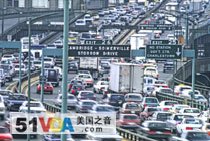02 July 2009
Increased fuel efficiency in cars and trucks has been a goal of governments, consumers and environmentalists for decades. Now, just as alternatives to petroleum fuels are becoming widely used, governments are having second thoughts about the impact fuel savings will have on their budgets.
Taxes have been levied on transportation fuels for decades. In 2007, the last year for which the U.S. Department of Transportation
has published data, the tax on gasoline and diesel fuels contributed
nearly $35 billion to the trust fund, but that is $4 billion less than what was
spent. Transportation planners are looking at new ways of raising money to pay for repairs and replacement of highways and bridges.
 |
| Proposal would tax drivers on each mile driven. |
With the help of a $16 million dollar federal grant, the University of Iowa began testing a system that would tax drivers on the miles driven instead of on each gallon of fuel purchased.
So far, 1200 vehicles have been using global positioning system monitors to track miles driven and another 1500 vehicles will be added to the project in the next few months.
"Fuel efficient vehicles are undermining the current system," says Kuhl, "and with vehicles - mainly cars and light trucks - coming to market using alternative fuel sources, the situation is going to get a lot worse." Electric vehicles, for instance, will pay no taxes. Hybrid vehicles will generate even less taxes.
But don't look for the new tax structure to be adopted soon. After the University of Iowa finishes its project next year, a report will be submitted to Congress and by 2015 a change could be made.
Privacy Issues
There are several questions that have to be answered and maybe the most important is how to safeguard privacy. "We have to make sure we don't collect too much information, such as where people drive," says Kuhl.
And then there is the question of how people will pay the tax.One proposal is to collect the information and then send drivers a bill in the mail.
"They could pay it, just like they do their utilities now," says Kuhl.